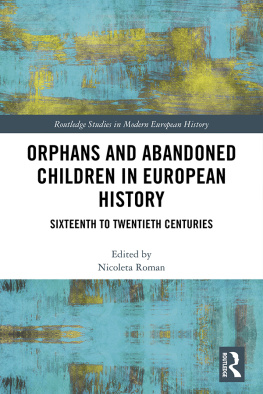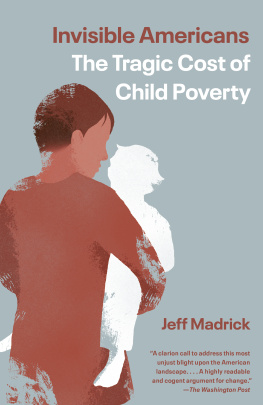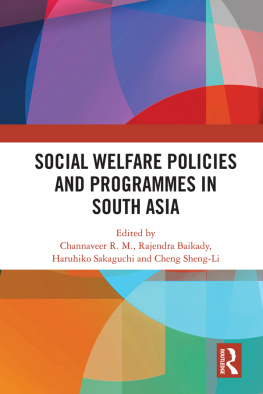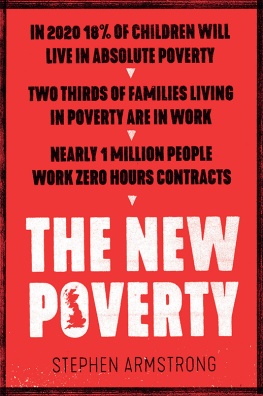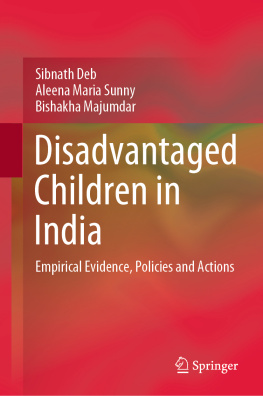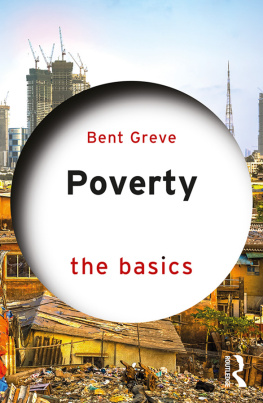
Praise for this book
This book makes a compelling case that a child-sensitive approach is both morally right and practically feasible for ending extreme poverty and achieving sustainable development goals.
Kul Chandra Gautam was formerly Assistant Secretary-General of the United Nations, and Deputy Executive Director of UNICEF
Practical Action Publishing has done it again, this time by producing an up-to-date briefing on what works or doesnt for reducing child poverty. About half of the worlds poor are children, with higher rates of poverty among children than among adults in both developing and better off countries. Richard Morgan and supporters have reviewed a list of actions at the top of todays thinking about what can be done, with professional assessments in everyday language of the lessons for mobilizing more action in the future. Most useful and an important read for all concerned.
Professor Sir Richard Jolly, Institute of Development Studies, Sussex
The book is a breakthrough in terms of building knowledge on child poverty in Africa on at least three counts: it gives prominence to an issue that is otherwise one of gross research neglect in Africa; it provides an authoritative benchmark for future efforts that aims to take stock of progress made in tackling child poverty; and third, it makes an historical departure from the usual doom and gloom depiction to a discussion of what has worked and what can be done better.
Thophane Nikyma, Executive Director, The African Child Policy Forum (ACPF)
The pathway to poverty reduction begins through collective action, allowing children to acquire foundational skills, develop their confidence as change-makers, build a solid asset base and secure future livelihoods as full economic citizens. CYFI believes that both this publication, and the Global Coalition to End Child Poverty, provides timely inspiration to policy makers and practitioners working to tackle child poverty through practical interventions and far reaching systems change under the 2030 Agenda for Sustainable Development.
Jeroo Billimoria, Founder and Managing Director of Child and Youth Finance International (CYFI)

Practical Action Publishing Ltd
The Schumacher Centre,
Bourton on Dunsmore, Rugby,
Warwickshire, CV23 9QZ, UK
www.practicalactionpublishing.org
Practical Action Publishing, 2016
All the chapters in this book, except for were first published as articles in Enterprise Development and Microfinance, an international journal.
The right of the editor to be identified as author of the editorial material and of the contributors for their individual chapters have been asserted under sections 77 and 78 of the Copyright Designs and Patents Act 1988.
All rights reserved. No part of this publication may be reprinted or reproduced or utilized in any form or by any electronic, mechanical, or other means, now known or hereafter invented, including photocopying and recording, or in any information storage or retrieval system, without the written permission of the publishers.
Product or corporate names may be trademarks or registered trademarks, and are used only for identification and explanation without intent to infringe.
A catalogue record for this book is available from the British Library.
A catalogue record for this book has been requested from the Library of Congress.
ISBN 978-1-85339-966-4 Hardback
ISBN 978-1-85339-967-1 Paperback
ISBN 978-1-78044-966-1 Library Ebook
ISBN 978-1-78044-967-8 Ebook
Citation: Morgan, R. (ed.) (2016) The Global Child Poverty Challenge: In search of solutions, Rugby, UK: Practical Action Publishing,
Since 1974, Practical Action Publishing has published and disseminated books and information in support of international development work throughout the world. Practical Action Publishing is a trading name of Practical Action Publishing Ltd (Company Reg. No. 1159018), the wholly owned publishing company of Practical Action. Practical Action Publishing trades only in support of its parent charity objectives and any profits are covenanted back to Practical Action (Charity Reg. No. 247257, Group VAT Registration No. 880 9924 76).
The views and opinions in this publication are those of the author and do not represent those of Practical Action Publishing Ltd or its parent charity Practical Action. Reasonable efforts have been made to publish reliable data and information, but the authors and publisher cannot assume responsibility for the validity of all materials or for the consequences of their use.
Typeset by Allzone Digital Services Limited Printed in the UK | |
Contents
Richard Morgan
Paul Dornan and Kirrily Pells
C.M. Ellis and Josh Chaffin
Nicola Hypher and Katherine Richards
Stephen Devereux
Munshi Sulaiman
Patricia Richter and Sophie de Coninck
Richard Carothers
Shahin Yaqub
Karen Moore
Rani Deshpande
Richard Morgan
Richard Morgan has worked in international development for almost forty years, focusing on policy and practical issues of poverty reduction in the developing world. Until recently the head of policy for UNICEF, he now leads a global initiative to combat child poverty with Save the Children. He is also the co-convenor of the new Coalition to End Child Poverty. Richard trained as an economist and worked initially in southern Africa, with roles ranging from small enterprise promotion to food security and rural development. Since the mid-1980s, he has focused on questions of policy and programme design for children. His wide-ranging interests and experience span social protection, inclusive basic services, livelihood strategies and how child rights principles can be used to deliver progress for the poorest children.
Richard Morgan
Abstract
This chapter introduces the case for development policy to treat the reduction of child poverty as an urgent and central issue, based on the still-pervasive nature of the problem and the extensive deprivations and socio-economic losses associated with it. Summaries are provided of the contributions to this book, which present findings and experience from a range of policies and interventions intended to benefit the poorest children in different societies while increasing their capacities and opportunities. An argument is made for adopting child-sensitive approaches to policies and designs for economic strengthening programmes, in ways that recognize the vulnerabilities, voices, and agency of children in poverty themselves.
Keywords: child poverty, inequality, developing countries, child labour, child refugees
ACROSS ALL REGIONS, CHILD POVERTY has long been an unduly neglected issue in national policy. Its implications for economic development have been underestimated and its impacts on societies, future prosperity, and for disadvantaged children themselves have been poorly understood.








